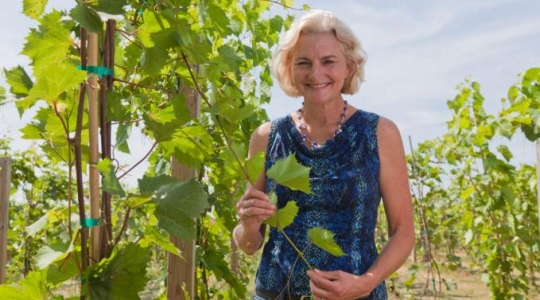DETROIT LAKES—When Penny Aguirre was growing up in Moorhead, her love of animals initially had her pursuing dreams of becoming a veterinarian, and after graduating high school, she enrolled as a pre-vet student at North Dakota State University in Fargo.
The registered U.S. patent agent and vintner has come a long way since then, though her love of animals remains undiminished. While at university, the Minnesota native discovered a strong interest in science and biochemistry, and ended up transferring to the University of Minnesota to obtain her bachelor’s degree in microbiology.
After graduating, Aguirre moved to Kansas City, Kansas, and began working as a scientist at the University of Kansas Medical Center. It was here that she unearthed a second love: horticulture.
“I’ve had many, many gardens over the years, and I still love it,” she says.
Aguirre became a student at the fledgling Plant Molecular Genetics Institute, working under Professor Alan Smith, and eventually earned her master’s degree in horticulture.
After graduating, she bought a small wholesale business, growing rare plants for mail order sales.
“That’s how I got to know all these ‘plant nerds,'” she laughed, noting that she counts herself among them.
“I became a plant collector, just like other people collect stamps or coins,” Aguirre said.
That passion for plants brought her to Santa Barbara, California, where she took a job as general manager at PlantHaven, a small, independent agency that worked to introduce new plant cultivars into the North American market—plants developed by breeders from all over the world.
“Part of that job was writing plant patents,” Aguirre says.
Eventually, she became knowledgeable enough about that part of the job that she decided to take the patent bar exam and become a registered U.S. patent agent.
“It’s the same bar exam that legal students take to become patent attorneys,” Aguirre said. “If you have a bachelor’s degree in one of the sciences, take the exam and pass, at that point you are a registered patent agent.”
Patent work
Though most patent agents specialize in design or utility patents, Aguirre made the relatively unusual choice of specializing exclusively in patenting plants.
“I started my own small business, Biological Patent Services,” she said. It’s a business she still operates herself, despite having taken on full ownership of the winery this past winter, after having either one or two co-owners in all the previous years since Richwood Winery opened in 2006.
Though her clientele includes plant breeders from all over the world, Aguirre actually does most of her patenting work right here in Minnesota.
“About 70 percent of my business is from foreign plant breeders, especially in Europe,” she said. “I try to get to Europe at least once a year, but I don’t have to travel a lot for the patent business. Most of the work I do is by email.”
Still, she says, she likes to visit with her clients in person as often as she can. “The people in the plant industry are fabulous,” she said. “Everyone has such a passion for it.”
Plant patenting mostly involves writing a lot of very detailed descriptions—”every leaf, every stem, every stamen, every pistil,” she said, noting that there are often very minute differences between plant varieties.
A big part of her job in the early years was working with her alma mater, the University of Minnesota, on getting patents for the cold-hardy plant varieties that university researchers had developed: Crops like apples, shrubs, perennials—and grapes.
Aguirre remembers a visit with fruit breeders Peter Hemstad and Jim Luby at the Horticultural Research Center located near the Minnesota Landscape Arboretum in Chaska, while working on the patent for Marquette grapes.
“They invited me to taste their wine, and I thought, ‘This is pretty good wine!'” she said. “That’s how I found out about all these little Minnesota wineries and grape growers, and I started to meet the people who got me interested in doing it.”
Vineyard
In 2006, Aguirre and then-partner Mike Bullock were looking for a place to open a vineyard and/or winery when they stumbled across a small property just west of the tiny village of Richwood, near Callaway.
Though it required some remodeling to the existing residential home and outbuildings to transform it into a commercial operation, the property had everything they needed to start their own vineyard and winemaking operation.
Many of the Frontenac Gris, La Crescent and Marquette grapes grown in the Richwood Winery vineyard today are varieties that Aguirre helped to obtain the patents for—as are several of the plants found in the winery’s gardens.
“I would love to spend more time on the gardens here,” she said. “I hope to be able to share even more of these wonderful plants that I helped to patent—or at least the ones that are hardy enough to survive here.”
Though the tasting room and gift shop at the winery will only be open to the public for a few more weeks—it closes for the winter at the end of October, and won’t open up again until May—Aguirre says she will still be spending plenty of time there in the coming months.
“When we close for the season, the winemaking is just getting started,” she explained. “It takes all winter.”
Currently, Richwood Winery produces eight different vintages of red, white and rosé wine, though that number ebbs and flows as different varieties are developed and become popular—or not, as the case may be. The names are as colorful as the winery itself: Carmen’s Cab, Rosie’s Red, Buffalo Red, Marquette, Metro Marquette, La Crescent, Frontenac Gris, and Frontenac Rosé.
Aguirre says making wine has pretty much been a learn-as-you-go process, though she added that she studied a lot of books and took as many educational courses as she could in order to prepare for that first winemaking season … and continues to expand on her knowledge as often as possible.
“I have a degree in microbiology, and worked for many years in the field, so I had a little working knowledge of the testing process,” she said. “Just having that experience did make it a little easier, but mostly I learned by just doing it.”
Those who would like to taste the results for themselves are welcome to stop by the winery in person: The tasting room and gift shop are open every weekend, Friday through Sunday, until the end of October, from 1 to 6 p.m. daily. There is live music on Saturdays through the end of September as well.
Source: wctrib.com











